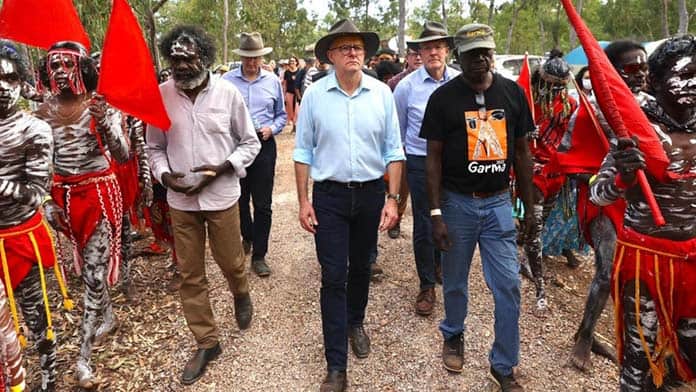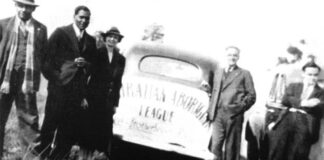On 30 July, at the Garma festival, Anthony Albanese outlined the details of Labor’s proposed constitutional reform to enshrine an Indigenous “Voice to Parliament”.
These details confirm that the planned referendum will offer no constitutional rights to Indigenous people and ensure the Voice has no enshrined powers.
As with Labor’s recent climate change legislation, the Voice referendum is concerned with symbolism and an appearance of progress, while the destructive impact of racism and punitive policy continues to grind on across Aboriginal communities.
Labor has no serious plans to address the crises of mass incarceration and deaths in custody, removal of children in unprecedented numbers, mass unemployment and poverty, or the continuing attacks on Aboriginal lands by resources companies.
Albanese’s proposed changes to the constitution simply state that there will be a body called an Aboriginal and Torres Strait Islander Voice and that it may make “representations” to parliament and the executive government.
The government will be under no legal obligation to even consider this advice, let alone to ensure Aboriginal people exercise any real control over policies that affect them.
When last in office, Labor legislated to continue John Howard’s racist NT Intervention, systematically defying the demands of all peak Aboriginal organisations in the NT and comprehensive consultations with the communities themselves.
It’s clear who would win out if Voice policy proposals conflicted with powerful interests–if it called for veto rights for Aboriginal people over developments on their lands, for example, or for police to be disarmed in Aboriginal communities.
As Albanese reiterated to ABC radio after his speech: “This isn’t a body that is on top of the parliament, it’s not even at the side of the parliament.”
Criticisms of the tokenistic nature of Voice proposal have been made by many Aboriginal activists since a group of delegates walked out of the major conference in 2017 that launched the Uluru Statement from the Heart.
In response to Albanese speech, a statement from the Tasmanian Aboriginal Land Council read: “To limit Aboriginal empowerment within Australian democracy to advice only is belittling, patronising and a racist double standard.”
Controlled by parliament
Albanese’s proposed clause stipulates that parliament will “have power to make laws with respect to the composition, functions, powers and procedures of the Voice”.
Critics from both the left and the right have called for more details on how the Voice would function. But under this proposal, a hostile government could dissolve any Voice that became too outspoken, regardless of its structure, and replace it with something more compliant.
This is exactly what happened to other advisory bodies when Bob Hawke abolished the National Aboriginal Conference in 1985 and John Howard abolished ATSIC in 2004.
The government could even hand-pick members of the Voice, as the constitution will make no reference to elections or any participation by communities themselves in choosing their own representatives.
Subordination to Parliament has been a key feature of the Voice proposal since it was conceived by Noel Pearson and his supporters in 2014, seeking to win over the political right and Corporate Australia.
As Pearson told the ABC following Albanese’s speech: “This isn’t a proposition that has its origins in a leftist proposal. And in my view, this is the formula for success, because we need constitutional conservatives and conservatives, and Liberals generally, to join this journey to complete the recognition of Aboriginal and Torres Strait Islander people.”
Early advocates of the Voice included the Business Council of Australia, and mining companies such as BHP have long subsidised Uluru statement campaign activities. These companies are happy to support the Voice precisely because they know it poses no threat to their power.
Fighting racism
There have always been strong Voice supporters in the Liberal Party, such as current shadow Minister Julian Leeser.
Since 2017, however, the leadership of the Coalition has preferred to posture against a referendum, using racist rhetoric that rejects any idea Aboriginal people are oppressed or deserve rights as First Peoples.
While Dutton has not committed either way on the referendum, racist campaigning against the Voice has been enthusiastically taken up by Pauline Hanson and by hard-right members of his own party such as CLP Senator and Warlpiri woman Jacinta Price.
In the context of many years of Liberal opposition, Indigenous advocates for the Voice campaigned to keep the Voice on the agenda and win support from across civil society. Polls consistently show clear majority support for the Voice in the electorate, a clear rejection of Hanson-style racism.
In whatever form a future government allows a Voice to exist, however, it won’t be an advisory body that defends and extends Indigenous rights. Rather, the need is to mobilise widespread sentiment against racism into a struggle from below, like the strikes that won equal wages and land rights for the Gurindji and grass-roots campaigns like the one that stopped the Muckaty nuclear waste dump and the Jabiluka uranium mine.
This is where the real power lies to challenge dispossession and oppression and fight to end the systemic racism deeply embedded in Australian capitalism.
By Paddy Gibson






